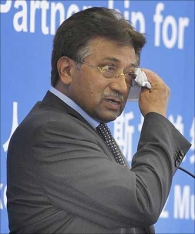 Pervez Musharraf may become the first dictator in Pakistan's history to face trial for high treason as the new government has decided to go ahead with a case against him for abrogating the Constitution and imposing emergency rule in 2007, a media report said on Friday.
Pervez Musharraf may become the first dictator in Pakistan's history to face trial for high treason as the new government has decided to go ahead with a case against him for abrogating the Constitution and imposing emergency rule in 2007, a media report said on Friday.
The government will support measures to uphold the Constitution and rule of law instead of saving 69-year-old Musharraf from trial on a charge of high treason, an unnamed federal minister was quoted as saying by The News daily.
The minister, who holds an "important portfolio in the cabinet", said in line with Pakistan Muslim League – Nawaz’s chief Nawaz Sharif's indication before his appointment as prime minister, the government will support Musharraf's trial for high treason.
The minister told the paper that the PML-N government would ensure that the apex court's decision in the case is implemented.
Former attorney general Irfan Qadir had submitted a statement saying that the interim administration, which conducted the May 11 polls, was not interested in prosecuting Musharraf.
He further contended that the next elected government should decide the matter.
During the last hearing of the case, the Supreme Court had made it clear that it would implement Article 6 of the Constitution in the case against Musharraf "even if heavens fall".
Attorney General Munir A Malik met Sharif a few days ago to ascertain the government's stance on the issue of putting Musharraf on trial under Article 6 of the Constitution, which relates to treason.
The meeting was held to decide the government's position when the case against Musharraf is taken up for hearing by the apex court on June 24.
Musharraf is currently being held at his farmhouse on the outskirts of Islamabad and is facing charges in three high-profile cases related to the 2007 assassination of former premier Benazir Bhutto, the killing of Baloch nationalist leader Akbar Bugti in a 2006 military operation and the imposition of emergency in 2007.
Musharraf could become the first dictator in Pakistan’s history to face trial for high treason.
Analysts have said that any move to put him on trial could also trigger a confrontation between the civilian government and the powerful army, which would not like to see a former chief being publicly humiliated.











 © 2025
© 2025